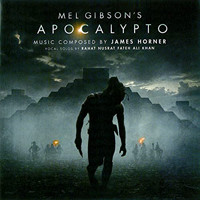- Composed by James Horner
- Holywood / 61m
We have become used to having dilemmas on how far we can separate the art from the artist in cinema in recent years following all the horror stories that have emerged about various previously-beloved filmmakers both in front of and behind the camera. Mel Gibson is certainly a case in point but I will say he has made some fine films in his occasional directorial outings; perhaps the most ambitious is Apocalypto, chronicling the final days of the Mayan civilisation and pulling absolutely no punches about its brutality. The film focuses on a man taken with other members of his village by a different tribe to be sacrificed, and his desperate escape and attempt to get back to his wife and son.
James Horner had sat out Gibson’s previous film The Passion of the Christ since he thought a Christian should score it (and John Debney stepped into his shoes in fine fashion) but was reunited with a collaborator who he was very close to. The resulting score is one of the most visceral of the composer’s career – not built on the melodies for which he was so famous but on atmosphere. The decision to not want music that would seem anachronistic is understandable, but it’s worth noting that the film is actually set two centuries later than Braveheart.

The opening “From the Forest…” is somewhat deceptive – while it’s not quite the standard Horner “forest music”, we do get sampled birdsong and a descending string motif that is quite evocative; it’s a brief track though and “Tapir Hunt” is an onslaught of percussion and extraordinary throat singing (by Terry Edwards) that plays its part in showing that even the “heroes” of the story were living a brutal life.
Along with the percussion and Edwards’s voice, Horner utilises his regular collaborator Tony Hinnigan to lead an array of ethnic soloists (mostly ancient and rare winds), reunites with The Four Feathers vocalist Rahat Nusrat Fateh Ali Khan and utilises an array of synths – there’s no orchestra here. All of these forces come together in the lengthy “Holcane Attack”, one of the most sustained sequences of gory action I’ve seen in a film – interestingly, Horner plays somewhat against the action at times, the synths combined with pulsing winds and Khan’s voice producing an almost hallucinatory feel. This is all the flipside to the score’s softest moment, “The Storyteller’s Dream”, with some florid wind solos (but no hint of a theme).
“Captives” is oppressively dark – Horner perfectly capturing the feeling of a hopeless situation – and “Entering the City with a Future Foretold” is the sound of resignation – the end is here. Blood-curdling horn-type sounds offer dire portents, the thunderous percussion sends shivers down the spine – it’s excellent film scoring, deeply unsettling music. The tone continues through “Sacrificial Procession” and “Words Through the Sky / The Eclipse”.
In the film “The Games and Escape” is where the tide begins to turn and there is immediately an added urgency to the score – it’s no longer quite such a death march, the percussion rumbles with a greater intensity, the array of winds cleverly come together in a way that suggests noises of the forest gaining in confidence. There is even a melody of sorts that emerges midway through the piece – it’s not exactly “For the Love of a Princess” but there’s just a little glimmer of hope in it.
Dark synths give way to more overt jungle percussion and unusual vocal stylings in the tense “An Elusive Quarry” but then there’s another moment of light to open “Frog Darts”, the melody from two tracks prior appearing now in a much warmer (albeit brief) arrangement for an ethnic flute but it’s not long before this gives way to intense action material once again.
There is no sense of musical relief at all in “No Longer the Hunted” despite its name (though there is a reprise of the more melodic material heard right at the start of the score), perhaps because up next is “Civilisations Brought By the Sea” – so, well done on narrowly avoiding being decapitated by the people from the city up the road, and then saving your family from being raped and murdered – here come the Spanish, I’m sure they’ll have your best interests at heart. Thunderous percussion has a slightly militaristic tone along with muted synth brass to give a little colour to the colonists’ arrival but it’s clearly more bad news. Horner closes the score in the reflective “To the Forest…” where he brings things full circle – the descending string phrase which opened the score is back, Khan’s vocal added this time – it’s contemplative, meditative but also a little elegiac.
I love James Horner’s music for its melody, the way emotion is expressed so outwardly – but on just a handful of occasions he wrote these much more visceral scores with synths joined by ethnic winds. Of them, Apocalypto is by far the best – primarily because while there isn’t much melody, there is still very clearly emotion – and despite being dominated by emotions that are as far from joy as it’s possible to get, it’s very hard to not be impressed by just how intense the experience is. Indeed, this is arguably the most daring and perhaps even the most creative score of the second half of Horner’s career, one that’s never going to get as much play-time as many of the greats that he conjured up over the years but certainly one to deeply admire.
Rating: ****
facebook.com/moviewave | twitter.com/MovieWaveDotNet | amazon.com












Video from the scoring sessions: